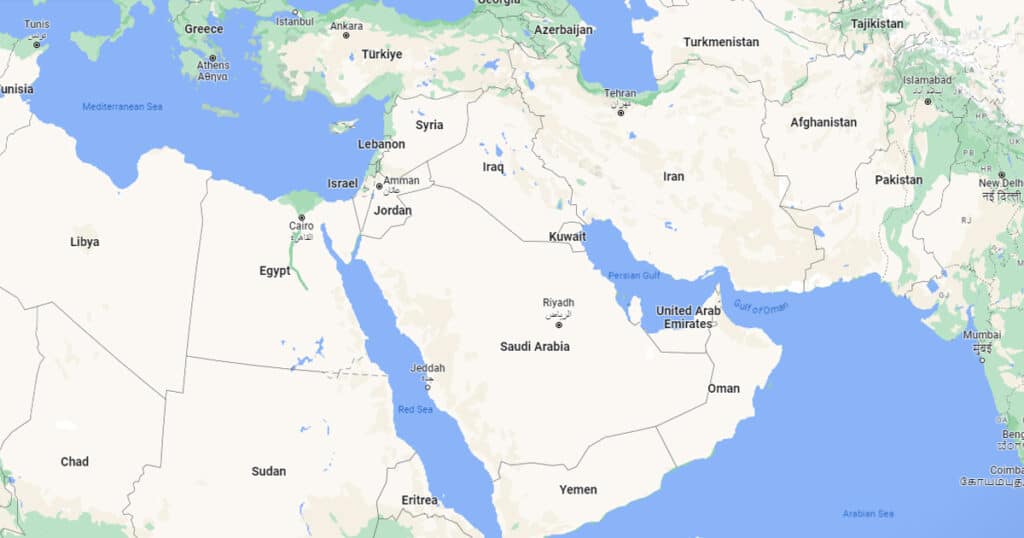
Steven Simon’s “Grand Delusion”: A New Book Takes Aim at American Foreign Policy in the Middle East
America’s abysmal Middle East foreign policy comes under examination in Grand Delusion: The Rise and Fall of American Ambition in the Middle East, a new book by Steven Simon. Simon reviews more than four decades of American endeavors in the region, entering from the perspective of eight presidential administrations, from Carter to Biden. The book’s chapters illuminate National Security Council thinking on the vexing national security issues: Iranian influence in the Levant in the 1980s, the response to the U.S. Marine Corps barracks bombing in Beirut, the unsolvable Israel-Palestine quandary, and the rise and then fall of Saddam Hussein and the resultant chaos in the Iraq and Syria.
Simon, a former diplomat, and policy advisor with deep experience in American Middle East policy skewers the catastrophic choices made by one administration after another. The author’s experience allows him to take the reader inside many of these decisions, revealing the motivations, assumptions, and often broad confusion underlying the few triumphs and many blunders. For example, Simon’s explanation of the sad specter of America’s war in Vietnam War and its role in shaping policy in the Reagan and George H.W. Bush administrations is illuminating.
Many of the chapters burst with critical analysis and the kind of insight only someone involved in the policy debates and developments can offer. In particular, the author’s insight on the Clinton administration’s development of the Oslo Accords is insight generally unavailable elsewhere.
In the end, however, the insights offered by the author leaves this reviewer wanting more. The author does not go far enough to provide the kind of insight the book proposes to offer. Indeed, the narrow focus and the failure to provide alternative perspectives ultimately shortchanges the depth of the book’s insights.
Missing Context: Oversimplification of Complex Issues
Grand Delusion tends to oversimplify the multifaceted issues facing the Middle East. Simon frequently reduces complex geopolitical, cultural, and historical dynamics to shallow explanations aligned with his bias. Some of these seem a stylistic decision: Simon appears to want to get in and out of critical moments quickly to move the narrative along. This makes sense, given that there are many books covering in detail the major events he glosses over such as the Iran hostage crisis, the Persian Gulf War, the rise of ISIS, et al.
At times, however, Simon seems to intentionally limit the material presented to that which fits his narrative. This reductive approach hinders the reader’s understanding of the intricate and often contradictory motivations behind various actions. For example, he oddly attributes the failure of Arab Spring entirely to American mismanagement and lack of understanding. This section of the book fails to consider the domestic factors, historical legacies, and geopolitical interests that shaped the outcomes of the movement in different countries. By neglecting the complex interplay between external and internal dynamics, Simon’s analysis falls short of capturing the full scope.
Throughout, Simon consistently reinforces his argument that American emergent policy in the Middle East has been inherently flawed and misguided, even when it does not make sense to do so. For example, Simon dismisses, seemingly out of hand, the development of an international coalition that defeated ISIS through a combination of precision airstrikes and ground assaults – a rare and remarkable strategic and operational success. Simon claims, without much exploration, that ISIS’ territorial control was unsustainable irrespective of any opposing counteroffensive.
Similarly, Simon dismisses the Abraham Accords – the 2020 normalization of relations between Israel, the United Arab Emirates, and Bahrain – in a mere 127 words. The historic series of agreements serves as perhaps the Trump administration’s sole shining diplomatic achievement in the Middle East. The Abraham Accords represents a significant opportunity for American interests as well as stability in the region and deserve more analysis. Simon derides the agreements because the Emirates are disinclined to partner with Israel in a war with Iran. While this is accurate, the agreements, by fostering trade relations, seek to build a regional deterrence that will preclude a war with Iran.
Narrow Perspective: An American View of the Middle East
Simon’s keen analytical mind is evident throughout the book. For example, the chapter on the Reagan administration offers insight into the National Security Council’s advice on the bizarre and complicated Iran-Contra scandal. Throughout, Simon highlights instances where ambition eclipsed rational decision-making, leading to unintended consequences, such as America’s informal military alliance with Iraq during the Iran-Iraq War, which emboldened Saddam Hussein’s quest for regional power after the war.
Regrettably, the book focuses almost entirely on American perspectives and actions. A broader exploration of how regional actors responded to American ambitions – and how potential partners like the Saudis reacted to major American policy decisions such as the 2003 invasion of Iraq would have enriched the narrative and offered a more holistic view.
A Small Lens: Lack of Historical Context
The book is more memoir than history and its rigid structure – each of its eight chapters covers the decisions of a single administration – confines its diagnostic scope. Throughout, Grand Delusion focuses on events as they occurred without delving into the historical underpinnings that shaped the region’s trajectory. This omission weakens the analysis by neglecting the historical grievances, conflicts, and power dynamics that continue to reverberate in the present.
The first portion of the book could use more context. The book’s sweep starts in 1979 and ends with the present-day decisions rendered by the Biden administration. However, an understanding of the American response to regional chaos at the end of the Carter administration must build on a foundation of historical understanding.
While earlier presidents paid less attention to the region, the dynamic shifted with Jimmy Carter. This lack of consideration on the region is due almost entirely to the Islamic Revolution and the stunning loss of Shah – Henry Kissinger’s “king of kings” and champion of American interests in the Middle East. Indeed, Kissinger’s empowerment of Mohammad Reza Pahlavi – a policy that helped drive the shah’s fall, the Iran-Iraq War, and the subsequent spiraling chaos – goes unexamined in the book (indeed, Kissinger himself, the architect of the American embrace of Iran, is only mentioned in passing in “The Grand Delusion”). While Simon’s extensive experience within the U.S. State Department and the National Security Council grants him a unique perspective on the intricacies of U.S. policies and the resultant failures, that perspective was surely rooted in the critical decisions American administrations made about Iran before 1979.
Indeed, the Carter administration itself – which presided over consequential events such as the Camp David Accords, Egyptian president Anwar Sadat’s Israeli visit, and the calamitous attempt to rescue American hostages in Tehran – comes in for a mere 17 of the books 422 pages. Worse, Simon makes only passing reference to the 1953 U.S.-aided coup of Iranian Prime Minister Mohammad Mosaddegh, an action with generational impacts on American policy in the region. Indeed, the view of American motivation by not only Iranian hardliners but also many Arab leaders is based, at least in part, on the lingering legacy of the removal from power of Iran’s democratically-elected leader.
No Solution: A Lack of Policy Prescription
While “Grand Delusion” effectively highlights the failures and pitfalls of American ambition in the Middle East, it falls short in offering concrete policy prescriptions for moving forward. Critique, while valuable, is only part of the equation; a comprehensive analysis should also explore potential pathways for improved policymaking.
“Grand Delusion” compels readers to question prevailing assumptions about American motives in the Middle East. By exposing the gap between rhetoric and reality, the book urges us to critically examine the narratives presented by policymakers and media outlets. Simon’s retrospective analysis carries valuable lessons for shaping future American foreign policy. However, this book provides no real roadmap for avoiding the pitfalls of unchecked ambition.
Simon’s critique is scathing. Deservedly so. But it is also limited. That’s unfortunate. At a time when Iran’s nuclear enrichment nears weapons-grade levels, the Kingdom of Saudi Arabia looks to broker normalization agreements without American involvement, and violence on the West Bank continues abated, the stakes of American policy for the Middle East are too important for criticism without fulsome understanding or an alternative solution.
Joe Buccino served as the Communications Director for U.S. Central Command from April 2021 until July 2023. His book “Burn the Village to Save It,” about the 1968 Tet Offensive, is due out in the fall of 2024.
This article was originally published by RealClearDefense and made available via RealClearWire.



